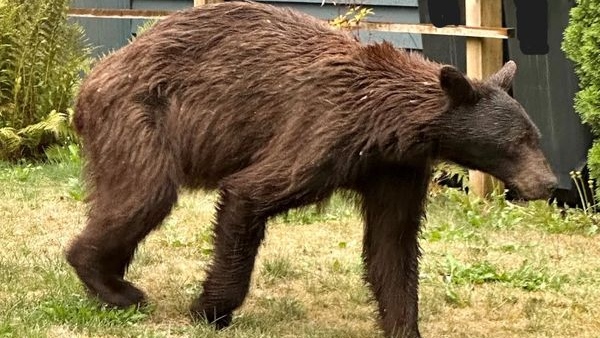As B.C. bears get ready to hibernate, advocates offer safety tips
 This photo shows a bear that was euthanized on the North Shore in September of 2023. (Image credit: Facebook/NorthShoreBlackBearSociety)
This photo shows a bear that was euthanized on the North Shore in September of 2023. (Image credit: Facebook/NorthShoreBlackBearSociety)
An emaciated bear was euthanized on the North Shore last week and advocates say the animal's condition could have been caused by feeding on garbage.
As summer winds down, bears are starting to prepare for hibernation and can spend as many as 20 hours a day foraging and eating, which means it's a crucial time of year for people who live in proximity to the animals to make sure they're not drawing the animals to their properties.
"Bears are opportunistic feeders, they use their amazing sense of smell and they roam around their territory looking for anything they can find that they can eat," explains Holly Resiner with the North Shore Black Bear Society.
"Their major source of information is their sense of smell. So they have this amazing system of olfactory sensors and nerves in their brains. They can smell hundreds of times better than a bloodhound, and two thousand times better than a person can -- and that's really what they use to navigate their territories," she continues.
Because of this, eliminating odours that may entice bears is key to keeping them away from garbage – particularly potentially dangerous plastics. Garbage and recycling bins should be free of food scraps, Reisner says, but if the scent of something appetizing lingers then a bear can mistake it for food.
"It's all about odour control," she says, adding that packaging should either be thoroughly washed or frozen and then added to bins as close to pick-up time as possible.
Reisner says the bear that was recently put down – who her organization nicknamed "Skinny Brown Bear" – may have had an intestinal blockage from eating plastic.
"This is one of the reasons that we really want to tell people that it's our responsibility to properly separate our garbage from our food waste so that those bears aren't ingesting plastic. They do ingest a lot of plastic and it's amazing that this sort of thing doesn't happen more often," she said.
"It's really our responsibility to look after these animals that we live with."
As for actual food waste, Reisner says freezing scraps throughout the week and only putting them in the compost bin on the day of collection is key to keeping bears away. Bins should be put out at the last minute or kept in a secure location and washed out weekly.
People with fruit trees are urged to harvest the fruit before it ripens and to make sure nothing is left to rot on the ground. Bird feeders can also be a big draw for bears and Resiner says they should be taken down.
And once a bear finds food once, it's likely to come back.
"It's amazing how they remember and return to food sources where they've had some rewards in the past," Resiner says.
The more bears become habituated to food and the more they return to residential neighbourhoods, the more likely they are to be deemed a safety risk and killed.
In July of this year, the BC Conservation Officer Service responded to 200 calls about black bears. In 51 of those cases the bears were destroyed, and in four they were hazed. There were zero cases of adult bears being relocated, but two cubs were taken to rehab.
CTVNews.ca Top Stories

Richard Perry, record producer behind 'You're So Vain' and other hits, dies at 82
Richard Perry, a hitmaking record producer with a flair for both standards and contemporary sounds whose many successes included Carly Simon’s 'You’re So Vain,' Rod Stewart’s 'The Great American Songbook' series and a Ringo Starr album featuring all four Beatles, died Tuesday. He was 82.
Hong Kong police issue arrest warrants and bounties for six activists including two Canadians
Hong Kong police on Tuesday announced a fresh round of arrest warrants for six activists based overseas, with bounties set at $1 million Hong Kong dollars for information leading to their arrests.
Read Trudeau's Christmas message
Prime Minister Justin Trudeau issued his Christmas message on Tuesday. Here is his message in full.
Stunning photos show lava erupting from Hawaii's Kilauea volcano
One of the world's most active volcanoes spewed lava into the air for a second straight day on Tuesday.
Indigenous family faced discrimination in North Bay, Ont., when they were kicked off transit bus
Ontario's Human Rights Tribunal has awarded members of an Indigenous family in North Bay $15,000 each after it ruled they were victims of discrimination.
What is flagpoling? A new ban on the practice is starting to take effect
Immigration measures announced as part of Canada's border response to president-elect Donald Trump's 25 per cent tariff threat are starting to be implemented, beginning with a ban on what's known as 'flagpoling.'
Dismiss Trump taunts, expert says after 'churlish' social media posts about Canada
U.S. president-elect Donald Trump and those in his corner continue to send out strong messages about Canada.
Heavy travel day starts with brief grounding of all American Airlines flights
American Airlines briefly grounded flights nationwide Tuesday because of a technical problem just as the Christmas travel season kicked into overdrive and winter weather threatened more potential problems for those planning to fly or drive.
King Charles III is set to focus on healthcare workers in his traditional Christmas message
King Charles III is expected to use his annual Christmas message to highlight health workers, at the end of a year in which both he and the Princess of Wales were diagnosed with cancer.

































